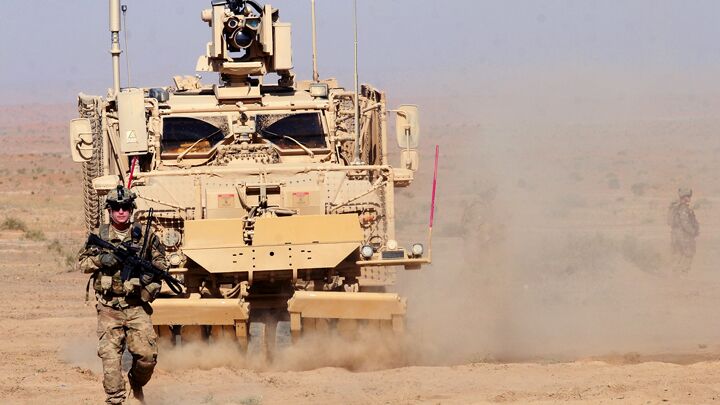
Scrapping the War in Afghanistan
America’s latest move in its retreat from Afghanistan has once again shown how desperate it is to remove itself from a costly and arduous war. While the United States attempts to hand over more authority and jurisdiction to Afghan forces, it is being forced to deal with what to do with all its equipment. Should it be transported, sold, abandoned, given to the Afghans, or destroyed? The U.S. has a mass of expensive machinery which, if not dealt with, could end up falling into enemy hands.
One of the biggest problems is what should happen to the mine-resistant ambush-protected vehicles (mrap’s). The problem with these hulking vehicles—which cost over $1 million apiece—is that they are too expensive to ship home. So the U.S. is now taking steps to scrap the vehicles.
The U.S. could have handed the vehicles over to Afghan troops, but the Afghans lack the ability to maintain and operate this equipment. Lt. Gen. Raymond V. Mason, the deputy chief of staff in Afghanistan, is reported as saying, “We don’t want to give [the Afghans] a lot of equipment that they can’t handle.” Instead, the U.S. has worked to outfit the Afghan forces with light all-terrain vehicles that are more suited to the Afghan landscape.
The option of selling the equipment is also unlikely to work. Buyers would have to try to get the equipment out of Afghanistan themselves, something the U.S. is already struggling with. To give more incentive, the U.S. could sell the military hardware at discount prices, but that would hurt the U.S. defense industry.
Afghanistan isn’t like Iraq. Iraq shared a border with Kuwait, which already housed U.S. military hardware. It was just a matter of driving south into the neighboring country and leaving the equipment there until it was reassigned. To drive the mraps out of Afghanistan would mean traveling south through Pakistan. According to Maj. Gen. Kurt Stein, who is overseeing the drawdown in Afghanistan, corruption, taxes, bribes and tariffs make it an expensive trip. Pakistan sees that it has the U.S. over a barrel, and will make the most of the opportunity.
The idea of transporting all the military hardware out of the country is not an option. More than 20 percent of America’s equipment will be scrapped, destroyed or abandoned. The remaining gear will cost $2-3 billion to repatriate, and then repairs will sap the U.S. government of a further $8-9 billion.
For now, the U.S. is cutting its losses and taking the less expensive option of selling the mraps for scrap. The U.S. is receiving only pennies for every pound of scrap it sells to local dealers. On top of that, because of the durable nature of the machines, it takes 12 hours to break down a single mrap. Million-dollar vehicles are being sold for loose change, and then there are workers that need to be paid for breaking the machines down.
A report from a Harvard research project totaled the cost of the wars in Iraq and Afghanistan as being between $4 and $6 trillion. That makes them the most costly wars in U.S. history. The billions of dollars the U.S. has invested in Afghanistan has not brought about peace. Nor have the lives and sacrifices of U.S. and other international soldiers brought real change. According to the Afghan ngo Security Office, the first quarter of this year has seen a 47 percent rise in attacks on Afghan security forces. Now, at a time when Afghanistan needs a strong U.S. presence, Washington is having the military tear apart its machinery and sell it off in pieces to scrap companies.
The U.S. is abandoning Afghanistan at a critical moment. The U.S. foreign policy of economizing its forces and becoming more of an observer than a major player when the battle is not yet won sends an ominous message to the world: America is tired of fighting. It has all the military armaments, but no will to use them.
For more on America’s retreat from Afghanistan, read “The Path to Defeat in Afghanistan.”
